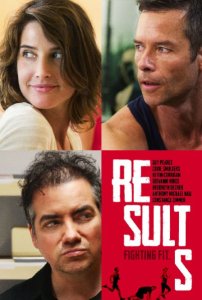 I don’t mean to diminish the “mumblecore” movement of films – although I suspect if you dislike the lot of them outright you won’t find much to sway you in “Results” – but while Andrew Bujalski’s latest has been described by critics as a move toward a more traditional rom-com, it’s a perfect example of how mumblecore can drag down a perfectly acceptable genre film.
I don’t mean to diminish the “mumblecore” movement of films – although I suspect if you dislike the lot of them outright you won’t find much to sway you in “Results” – but while Andrew Bujalski’s latest has been described by critics as a move toward a more traditional rom-com, it’s a perfect example of how mumblecore can drag down a perfectly acceptable genre film.
Mumblecore trades in realism, with characters meandering through life and the films themselves dealing primarily in casual, improvised dialogue and low production values. But just because your movie has realism doesn’t mean it needs to be “realistic.” Bujalski, one of the founders of the movement, proved with his last film “Computer Chess” that you could have a low budget but still be surreal and creative with genre expectations.
“Results” has the same level of “realism” but has a plot that echoes old fashioned screwball comedies. Danny, Trevor and Kat (Kevin Corrigan, Guy Pearce, Cobie Smulders) are caught in a love triangle under increasingly convoluted circumstances, but as would be expected of a mumblecore comedy, the madcap humor that would typically arise from such a genre is flat and muted, if not altogether absent. Even as these characters continue to get deep into sex, drama and emotion, it’s amazing how frustratingly little actually seems to happen in “Results.”
Danny is a recently divorced, out of work and out of shape dude who has fallen into obscene wealth and doesn’t have a clue what to do with his money. He wanders into Trevor’s health club Power 4 Life and explains his goal is to be able to take a punch and not be immediately brought down. Trevor puts Kat on the job, who’s testy with her clients and with Trevor, who she previously had an affair with. Danny gets a crush on Kat as soon as she does her first squat, and after a few sessions they make out. By the next meeting he’s gone too far with an elegant dinner, and Kat disappears from both Danny and Trevor’s life.
Part of the problem with “Results” has to do with this flimsy love triangle. “Results” has no clear perspective or main protagonist. Kat initially looks like the character capable of the most growth and in need of love, but she vanishes from the movie midway through to allow for an extended training montage of Trevor and Danny becoming friends. Danny too becomes conspicuously absent later on, with a romance emerging between Kat and Trevor a little more unexpectedly.
As for Trevor, he spouts health clichés about living inside your perfect body and attaining goals physically, mentally, emotionally and spiritually. All three have goals and aspirations but a lack of a clearly defined vision of what that future looks like or motivation on how to get there. Trevor would make for a good target for humor, particularly gym or fitness culture, but Bujalski doesn’t really care to go there.
I wish he would though. “Results” simply isn’t that funny. It’s certainly not jokey, nor does it make cynical, ironic fun of the gym-rat personality or their philosophies. Mumblecore films are made to be formless and bucking of narrative convention, but at least they have some excitement. The Duplass Brother films are all sharply written and comedic, even broad in their humor. Joe Swanberg’s movies have a strong sense of place and community in his home of Chicago. And Greta Gerwig, Anna Kendrick and Lena Dunham have charm and generational appeal.
Bujalski’s film just doesn’t get the same results.
2 stars
